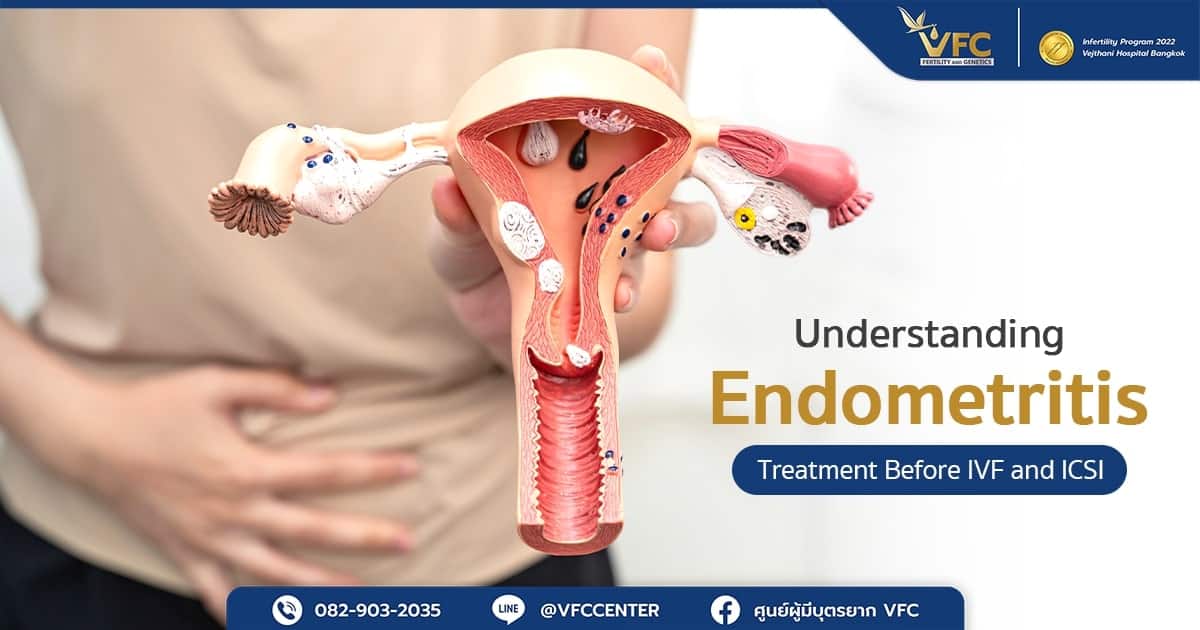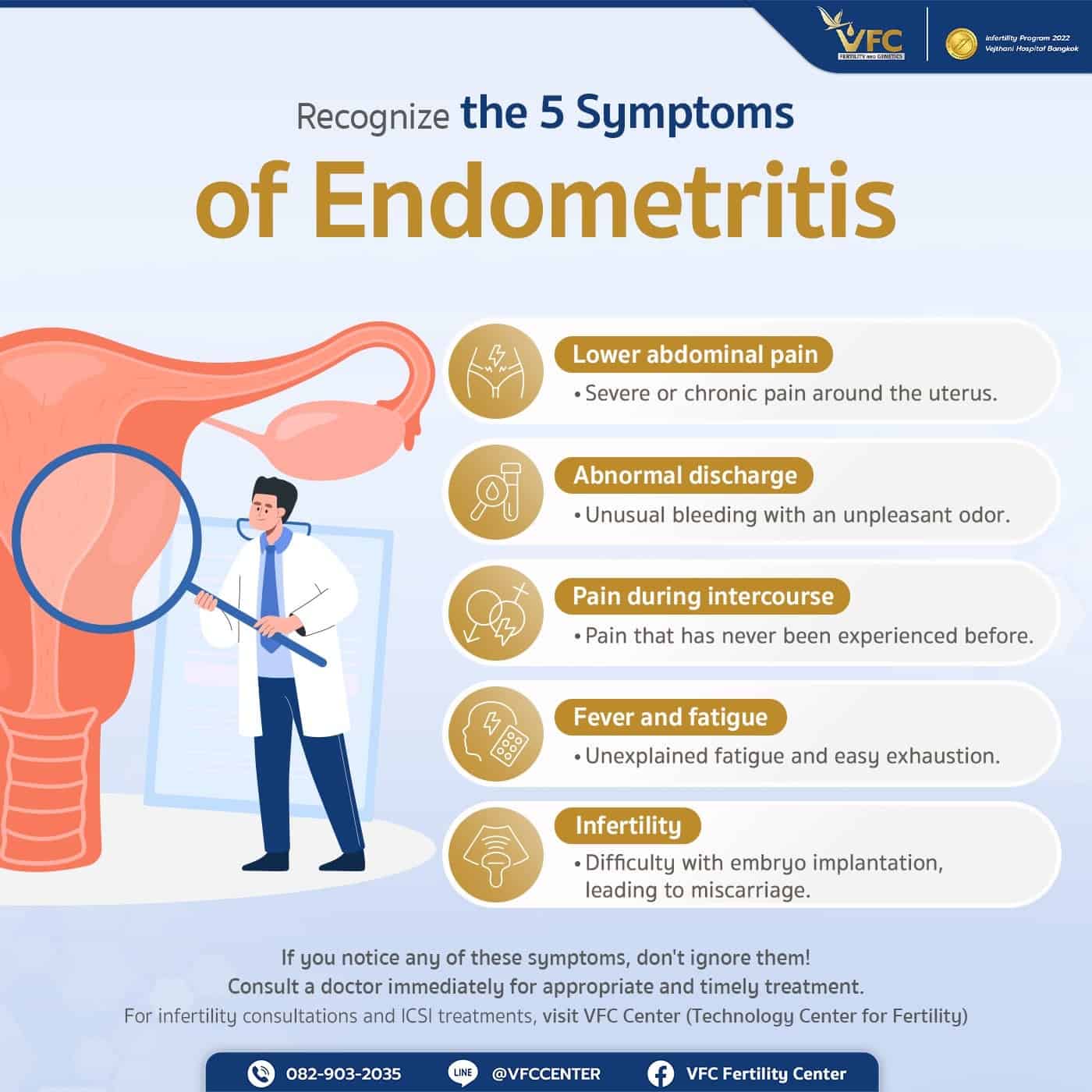
Endometritis or Endometrial inflammation is one of the causes of infertility, and it can also affect the success of IVF or ICSI treatments. Understanding this condition and receiving appropriate treatment can help restore a healthy uterine environment, increasing the chances of pregnancy. This also helps with preparing for IVF or ICSI treatments, enhancing the chances of a successful, effective, and safe pregnancy.
What is Endometritis?
Endometritis is a condition where the lining of the uterus becomes inflamed, usually due to an infection in the vagina or from unsafe sexual activity. If not treated properly, it can affect embryo implantation and prevent pregnancy. The main causes of endometritis often involve bacterial infections spreading from the vagina or cervix to the uterus. Common causes include:
- Post-medical procedures such as childbirth, abortion, D&C (dilation and curettage), IUD insertion, or uterine examinations.
- Sexually transmitted infections such as Chlamydia or Gonorrhea from unprotected sex.
- Personal risk factors such as a weakened immune system or a history of reproductive organ infections, which increase the likelihood of developing this condition.
2. Symptoms of Endometritis

The symptoms of endometritis can vary between individuals. Key symptoms to look out for include:
- Lower abdominal pain or discomfort in the uterus, which may range from severe pain to chronic pain.
- Abnormal discharge or unusual bleeding between periods, possibly accompanied by an unpleasant odour.
- Pain during intercourse, which may be new and unexplained.
- Fever or unexplained fatigue.
- Pregnancy-related issues or infertility, as inflammation can interfere with the uterine environment, preventing proper embryo implantation, leading to higher miscarriage rates or difficulty conceiving.
If you experience any of these symptoms, it is essential to consult a doctor for diagnosis and proper treatment. Diagnostic procedures may include physical examination, blood tests, and uterine tissue biopsy.
Treatment for Endometritis
The treatment for endometritis typically starts with the use of antibiotics to eliminate the infection. The following steps are often involved:
1. Antibiotic Treatment
Doctors may prescribe antibiotics, either intravenously or orally, depending on the patient’s condition. The treatment typically lasts for 10-14 days, and it’s essential to complete the full course, even if symptoms improve.
2. Further Diagnostic Testing
In addition to antibiotics, further diagnostic tests may be needed to check for other abnormalities in the uterus. Doctors may recommend ultrasound, hysteroscopy, or MRI to assess any damage and determine the appropriate treatment plan.
3. Treatment in Case of Complications
If complications arise, such as uterine abscesses or the spread of infection to surrounding organs, surgical intervention may be necessary to remove foreign matter or inflamed tissue.

How to Care for the Endometrial Lining and Prepare for IVF and ICSI
After treating endometritis, the next step is to prepare for IVF or ICSI, which can further increase the chances of a successful pregnancy. Proper preparation will ensure that the uterine environment is optimal for embryo implantation. The preparation for IVF and ICSI can be broken down into the following steps:
Consulting with an IVF Specialist
Consulting a fertility specialist will help you understand the proper steps to take. The doctor will provide personalised guidance on the best preparations and treatments to optimise your chances of successful conception.
Health Screening Before IVF or ICSI
Pre-IVF or ICSI health checks are vital. The doctor will assess if the infection has fully healed and ensure the uterus is in an ideal condition for embryo implantation. The check-ups typically include blood tests to measure inflammation levels, ultrasound scans, and possibly hysteroscopy if needed.
Lifestyle Changes
Making lifestyle changes can significantly help with IVF preparation. Patients should avoid sexual intercourse during treatment or as advised by the doctor to prevent reinfection. Proper nutrition, including foods rich in folate, vitamin E, and antioxidants, will support a healthy uterine environment.
Overall Health Management
Maintaining good physical health through regular exercise, avoiding smoking and alcohol, is essential for preparing the body for pregnancy. Additionally, focusing on quality sleep and stress management techniques like meditation, music, or engaging in enjoyable activities is essential.
If you suspect you have endometritis as a cause of infertility, the VFC Center (V Fertility Center), IVF Center in Thailand, is ready to provide expert fertility consultations and care, using the latest technology in a certified lab with specialists in reproductive health.
Article by DR. SORRAMON SONGVEERATHAM
Contact us for inquiries or appointments:
VFC Center – V-Fertility Center
Hotline: 082-903-2035
LINE Official: @vfccenter

OBSTETRICS AND GYNAECOLOGY-REPRODUCTIVE MEDICINE





No Comments
Sorry, the comment form is closed at this time.